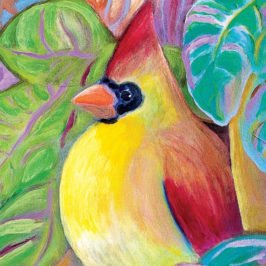

Figures of speech, featuring poems by Elizabeth Klise, Andy Macera and Conrad Hilberry.
7 minutes
TRANSCRIPT
I don’t know why, but I’ve been interested in language lately: one sign of it was that palindromes episode of Burning Bright a few weeks ago. More recently, I’ve been thinking about those quirky collective nouns like a pride of lions or a brace of ducks or a fleet of ships or a team of horses or a choir of singers. And that led me to Elizabeth Klise’s poem from Passager Issue 72, “Seventeen Questions from the Silverware Drawer.”
Why fleet and pride and labor?
Why words to describe the rare gatherings of mud
hens and lions and moles – and nothing
to capture the commonplace mayhem
of this menagerie? Why the violent affirmation of a murder
of crows, and not, say, a murder of the two dozen bamboo
skewers left over from last summer’s picnic?
Why the civic formality of a colony of ants,
and not a colony of the numerous small towns – tea, table,
soup, slotted, wooden, measuring – that comprise
this nation of spoons? Why a kindle of kittens,
and not a kindle of the mismatched spatulas that clutter
the confines of this space? Why no litter of ladles?
Why no covey of corks? Why a pod, a pack,
a paddling of dolphins, dogs, ducks – and nothing
for these skimmers and strainers and drainers and scoops?
Why no clowder of cookie cutters?
Why no watch of whips or whisks?
Why do coyotes, chicks, and sheep merit bands,
broods, and flocks – yet no word exists to contain
this sharp-edged zoo of scissors and slicers and shredders
and sifters and graters and ricers and dicers and forks?
Why no brace of beaters? Why no muster of mashers?
Why a quiver of cobras but not of corkscrews;
a flight of butterflies but not of butter knives;
a prickle of porcupines but not of potato peelers?
Why no wake of tongs or rake of prongs? Why an army
of frogs and a skulk of foxes, a charm of goldfinches
and a leash of greyhounds, a herd of harts and a down of hares . . .
but no collective term to contain the splendid squalor
of these cake breakers, egg beaters, meat mallets,
melon ballers, garlic presses, bottle openers,
and fondue forks? Why is so much reserved
for birds and beasts we will never see, and so little
for the gnashing metal creatures that churn
and slice and beat their way across the bowls
and plates of our everyday lives?
“Seventeen Questions from the Silverware Drawer,” Elizabeth Klise from Passager’s Winter ‘22 issue.
And that led me to even more language quirks that Passager authors have written about. Andy Macera said, “Whenever I hear someone say ‘from the bottom of my heart’ I always wonder if it was spoken with sincerity or sarcasm. The bottom of most things is not where the most positive qualities thrive.”
We are curious to see it
since it is always where
you are speaking from.
These days
it is too easy to imagine
the bottom as a rock
or a barrel, or
a line
bearing the weight
of a zero.
Sometimes it feels
as if the bottom of
your heart
is like a desert
where we squint into
the brutal sunlight
trying to focus
on the mirage of
your words.
We want to believe
it is a pool
of priceless marble
and mosaic tiles,
statues and fountains,
its depth exceeding
even Houdini’s held breath.
“The Bottom of Your Heart” by Andy Macera, also from Passager’s Winter ’22 issue.
And finally, a villanelle from Conrad Hilberry. A villanelle is a 19-line poetic form with specific rules about rhyme and repetition that I won’t go into here. This one’s about something that increasingly, only English teachers and sticklers for rules care about—the difference between lie and lay.
You hear it even in the villanelle –
the subtle elbowing of lie and lay.
They both go down to bed – so who can tell?
But neither one will wish the other well.
“No transitives in here,” cool lie will say,
stretched on her sofa in the villanelle.
Lay points out what couples know full well,
that lie implies some distance – there, away –
when two go down to bed, in parallel.
All seems quiet in stanza four until
lay lets two sensuous voices have their say,
active and passive, nuzzling the villanelle.
Let’s have them both, lie, the asphodel
that littered the Elysian Fields, and lay,
the drooping blooms of fuchsia on the sill,
each offering its high-tongued syllable
as you and I lie waiting in the hay.
Together they invite the villanelle
to sing, to pass the savory muscatel.
Conrad Hilberry’s villanelle “Lie and Lay” from Passager Issue 51. He said, “I thought a villanelle might be the right form for ‘lie’ and ‘lay.’ It’s repetitive, it takes its time, it doesn’t mind holding up and turning over a distinction that no one pays any attention to in the real world. Let’s enjoy the distinction before popular usage tosses the two words into the same pot.” I think popular usage has already tossed the two words into the same pot.
To subscribe to or learn more about Passager and its commitment to writers over 50, go to passagerbooks.com. You can download Burning Bright from Spotify, Apple and Google Podcasts and various other podcast apps.
For Kendra, Mary, Christine, Rosanne, and the rest of the Passager staff, I’m Jon Shorr.
Not pictured above: Conrad Hilberry






